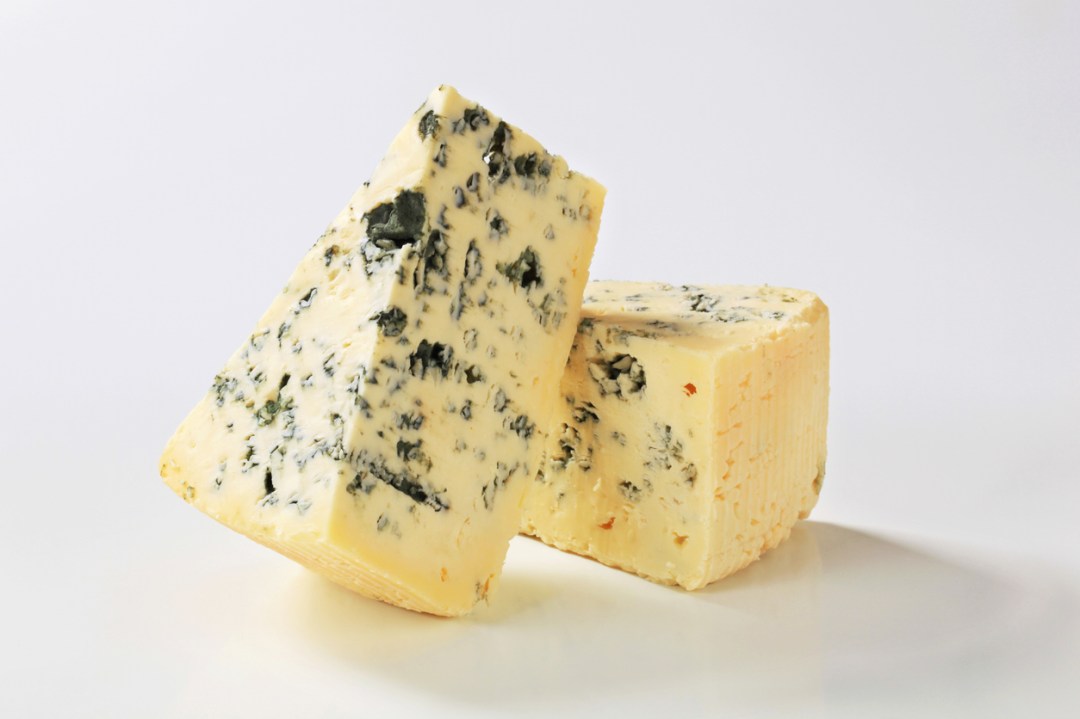I love Roquefort, having been introduced to it when I was 16 by our French exchange student Geneviève, whose father was a producer of the cheese. She brought some in her luggage, wrapped in many layers of brown paper so that the unique, pungent smell wouldn’t invade her clothes. My parents, gourmet cooks and gourmands, immediately started incorporating Roquefort into their menus. Back then it was difficult to find a blue cheese on the US east coast (although Wisconsin had been making one for centuries).
When a food shop called Amanda’s opened in Westport, Connecticut, my Swedish mother would drive the seven miles from where we lived to buy Roquefort and other international gustatory goodies (kuminost – a mild Swedish cheese with cumin – was also on her weekly list).
Roquefort cheese has been around since Roman times – as has the town it’s named for – and monks from St Gall discovered that by putting cow’s-milk cheese in local caves to age, natural blue stripes from subterranean bacteria produced an unusual, savoury cheese.
Before 1925, the appellation system that protects French products from imitation didn’t exist. Farmers could make Roquefort from cow’s milk as well as ewes’ milk. Now there are only 1,300 farms in permitted zones that produce raw milk from Lacaune sheep, the only legal breed for Roquefort. Every wheel of cheese spends at least two weeks in the seven natural caves in Roquefort-sur-Soulzon to bask in the local microbes, which in theory give each brand its own signature.
Alas, taste for Roquefort has declined in the past decade. Is the date significant? Millennials find the cheese too pungent and expensive. Wile twice the number of French Gen Z say they never eat cheese compared to adults, while their preference tends to be for decidedly un-Gallic options like mozzarella and Emmental. Meanwhile, the sale of goats-milk cheeses is down 9 per cent across the country. Many French no longer include a cheese tray after pudding – once de rigueur – as their take-home pay diminishes and the country struggles with a huge national debt and uncertain leadership.
Millennials find the cheese too pungent and expensive
As I write, riots are bursting out in major French cities. The Macron government will probably fall, as the French President tries to save his disastrous reign. The French are great at revolution, their most famous of course being 1789, where guillotine-wielding extremists tried to kill off the aristocracy. It might be argued, as de Gaulle did when he created the Fifth Republic, that a country that can produce more than a thousand cheeses has to be rather bad at governing.
I remember in December 2018 when the gilets jaunes (yellow jackets) tried to bring France to a halt, as the same leftist agitators are trying to do now. I didn’t live in France then. But my family did and, even though they sympathise with much leftist philosophy, I recall them telling me how inconvenient it was not being able to get into Beaune, ten minutes away. The Roquefort producers themselves have also gone on strike. In 2009, farmers blocked a site that was crucial to cheese production, protesting the sudden drop in the price of cheese. Earlier this year, producers took to roundabouts to protest Macron’s presidency.
Still, I couldn’t wait to accept my family’s invitation to move to France three years ago, after my husband died. When I wrote in August for Spectator Life about the terrible state of French hospital food, a well-meaning family member suggested I should not have written the story in case I needed to go to the hospital again. I chuckled and told her, ‘But I write about food and the truth.’ There is a truth in the decline of Roquefort, one that the French President would do well to recognise.








Comments